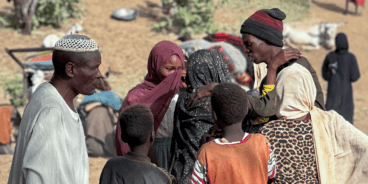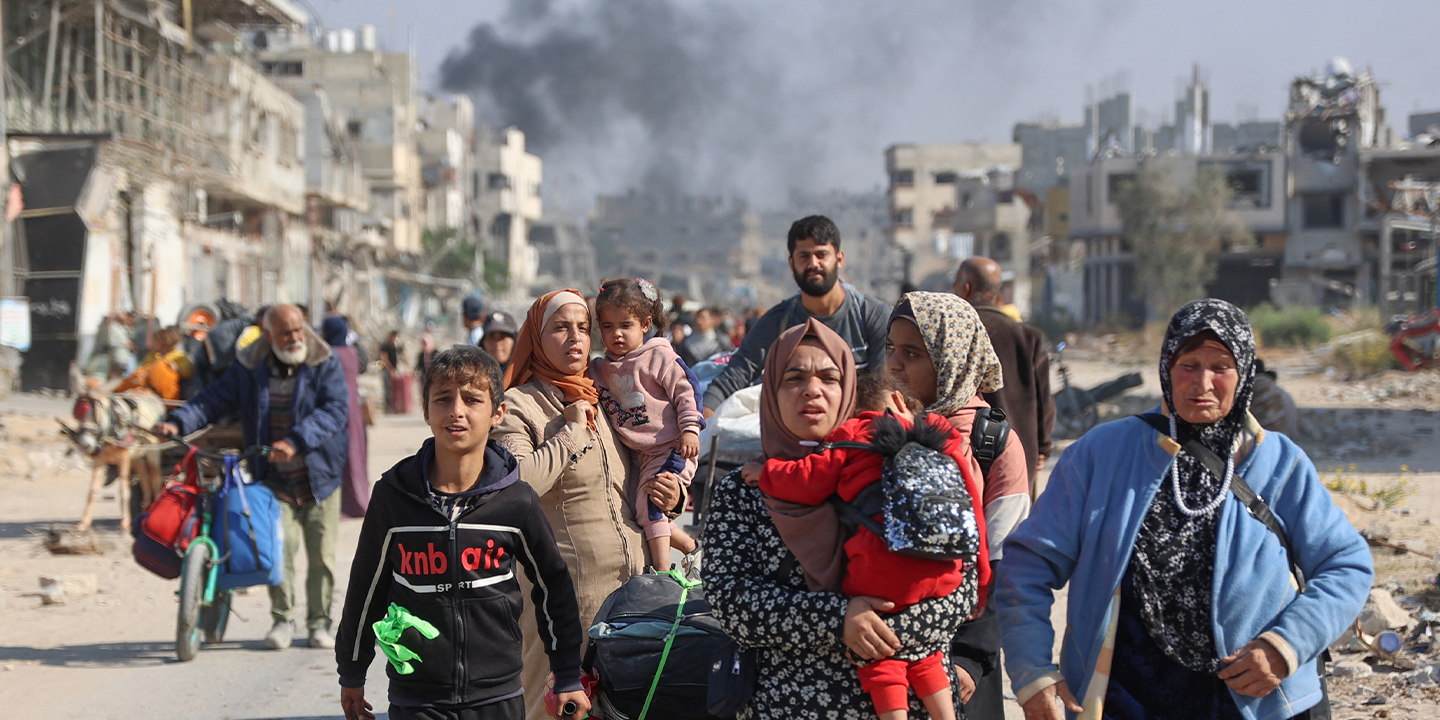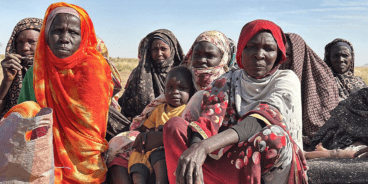

Atrocity Alert No. 417: Israel and the Occupied Palestinian Territory, Sudan and Nicaragua
Atrocity Alert is a weekly publication by the Global Centre for the Responsibility to Protect highlighting situations where populations are at risk of, or are enduring, mass atrocity crimes.
POPULATIONS IN NORTHERN GAZA FACING CATASTROPHIC CONDITIONS AMID ISRAEL’S SIEGE
For over a month, Israel’s intensified siege on northern Gaza – particularly around Jabalya, Beit Lahiya and Beit Hanoun – has resulted in widespread devastation and deprivation for the Palestinian population. The UN Relief and Works Agency for Palestine Refugees in the Near East (UNRWA) warned that “Palestinians are being burned and buried alive by airstrikes,” as Israel continues to bomb residential buildings, schools serving as shelters and tents sheltering displaced families. According to the Ministry of Health in Gaza, 274 Palestinians were killed and 729 injured between 5 and 12 November alone. The UN estimates that between 100,000 and 130,000 people have been displaced since 6 October and about 75,000 people remain trapped in the north. Ilze Brands Kehris, Assistant Secretary-General for Human Rights, stressed, “The manner in which the Israeli military is conducting operations in northern Gaza suggests not only that Israel’s actions are seeking to empty northern Gaza of Palestinians, by displacing survivors to the south, but points to further grave risks of atrocities of the most serious nature.”
Israeli forces have also besieged the last remaining hospitals, with hundreds of patients and staff trapped inside, vital equipment destroyed and health workers and patients deliberately targeted and arrested. The UN Independent International Commission of Inquiry on the Occupied Palestinian Territory, including East Jerusalem, and Israel, recently determined that Israel has perpetrated a concerted policy to destroy Gaza’s healthcare system as part of its broader assault across the enclave.
Amid the relentless assault, Palestinians are also facing a brutal blockade, resulting in life-threatening shortages of food, medical supplies and other essential aid. On 8 November the Integrated Food Security Phase Classification Famine Review Committee issued an alert stating there is “a strong likelihood that famine is imminent in areas within the northern Gaza Strip.” According to the UN Office for the Coordination of Humanitarian Affairs, Israeli authorities did not facilitate any humanitarian movements to Jabalya, Beit Hanoun and Beit Lahiya between 6 and 31 October, and no UNRWA personnel have had access to the north in over a month. Across the enclave, approximately 80 percent of the population – 1.7 million people – did not receive food rations in October.
The humanitarian catastrophe is a direct result of Israel’s tactics. A recently released report by the Office of the UN High Commissioner for Human Rights concludes that “Israel appeared to fail to take sufficient steps to avert famine and end starvation,” adding that “statements made by Israeli officials raised concerns that starvation was deliberately inflicted by Israel to punish the civilian population…” The repeated obstruction of the entry and provision of life-saving aid violate the three provisional measures orders by the International Court of Justice (ICJ) and amounts to the war crime of intentional starvation of civilians as a weapon of war.
As the occupying power, Israel has the obligation to ensure the provision of food and medical care for populations in Gaza. Israel must fully cooperate with UN agencies and other humanitarian actors in Gaza to allow free, unimpeded and safe humanitarian access. Israel must immediately implement all ICJ provisional measures orders. States parties to the Genocide Convention must help ensure Israel’s compliance.
UN SANCTIONS RSF COMMANDERS AMID MOUNTING EVIDENCE OF ATROCITY CRIMES IN SUDAN
For the first time since the outbreak of violence in Sudan during April 2023, on 8 November the UN Security Council (UNSC) imposed sanctions on two commanders of the paramilitary Rapid Support Forces (RSF). Major General Abdel Rahman Juma Barkalla, the RSF’s West Darfur commander, and Major General Osman Mohamed Hamid Mohamed, head of RSF operations, were added to the UN’s sanctions list for engaging in actions or policies that threaten the peace, security or stability of Darfur, including acts of violence and human rights abuses. This decision represents a notable and welcome move by the UNSC, signaling increased international pressure on those perpetuating the conflict and atrocity crimes.
The UNSC’s decision came a few weeks after the UN Human Rights Council-mandated Fact-Finding Mission (FFM) published a report concluding that the Sudanese Armed Forces (SAF), RSF and their allied militias are responsible for large-scale violations of human rights and International Humanitarian Law, many of which amount to war crimes and/or crimes against humanity. The report highlights incidents of torture, rape, sexual slavery and persecution based on ethnicity and gender, with the majority of sexual violence incidents attributed to the RSF. According to the FFM, acts of sexual violence were committed in Darfur with extreme cruelty, including with the use of firearms, knives and whips to intimidate victims while making racist and sexist slurs and threats. This violence was part of a strategy to terrorize civilians, punish perceived opposition supporters and suppress resistance. Joy Ngozi Ezeilo, an FFM member, said, “Without accountability the cycle of hatred and violence will carry on. We must put a halt to impunity and bring perpetrators to account.”
In response to the continued escalation of violence and mounting evidence of atrocity crimes, the UNSC is currently negotiating a potential resolution aimed at operationalizing some of the recommendations for the Protection of Civilians (PoC) outlined by the UN Secretary-General in his 21 October report. While the report underlines that establishing a ceasefire is the most effective way to protect civilians, and remains crucial for long-term peace, it should not be viewed as a prerequisite for protecting vulnerable populations.
The Global Centre for the Responsibility to Protect’s Sudan expert, Juliette Paauwe, stressed, “The UNSC must explore alternative and creative strategies and utilize available tools to halt ongoing violence and enhance civilian protection, including by working on smaller, more manageable objectives – such as ensuring humanitarian access or securing temporary truces for specific regions. Additionally, it should consider various operational modalities for deploying a protection force once a ceasefire is achieved.” At a minimum, the UNSC should consider establishing a robust compliance mechanism to monitor the implementation of the Jeddah Declaration, which outlines the commitments agreed to in May 2023 by the SAF and RSF regarding PoC and the facilitation of humanitarian assistance.
UN EXPERTS WARN OF SYSTEMATIC REPRESSION TARGETING UNIVERSITIES IN NICARAGUA
In a report dated 6 November the UN Human Rights Council-mandated Group of Human Rights Experts on Nicaragua (GHREN) warned that the government is systematically targeting Nicaragua’s university sector as part of its widespread repressive campaign against dissent that has been marked by the commission of crimes against humanity.
University students, professors, academic administrators and other personnel have been particularly targeted in violations and abuses, including murder, imprisonment, torture, deportation and persecution for political reasons, some of which may amount to crimes against humanity. The GHREN documented that the government is resorting to “physical and psychological violence, including threats, intimidation, beatings and prolonged solitary confinement – which could in some cases amount to torture – against students and professors, especially those arbitrarily detained, for having participated in the 2018 protests or for publicly criticizing the Government.” In addition, authorities have systematically closed universities, expelled students perceived as critical of the government and have exercised strict control over the remaining functioning institutions to “eliminate their autonomy and turn them into centers of political control.” The GHREN also warned that systematic repression “has made it impossible for opposing students or those perceived as such to continue their studies, undermining the contributions of future generations to the country’s development.”
Universities in Nicaragua have been important venues for anti-government demonstrations, which first escalated in April 2018 in response to pension cuts. The protests were met with a brutal crackdown by state and pro-government actors. Since then, President Daniel Ortega and his wife, Vice President Rosario Murillo, have overseen the country’s rapid descent into authoritarianism and the systematic persecution of a broad range of alleged opponents and independent voices. For more than six years, Nicaragua has attempted to eradicate voices of dissent in and outside the country. Ongoing crimes against humanity have been facilitated by more than a decade of the deliberate dismantling of checks and balances and instrumentalization of the country’s executive, judicial, legislative and electoral branches. In parallel to systematic attacks and the closure of civic space, the government has also isolated itself from regional and international scrutiny and engagement, further facilitating persecution of large segments of Nicaragua’s society.
Savita Pawnday, Executive Director at the Global Centre for the Responsibility to Protect, said, “While there is no quick fix to Nicaragua’s crisis, and the government so far seems unreceptive to international condemnation, UN member states must continue to explore coordinated action to respond to the commission of crimes against humanity. The analysis and recommendations regularly provided by the GHREN should form the basis of such efforts.”
Related Content


Joint Statement: Genocide Returns to Darfur
